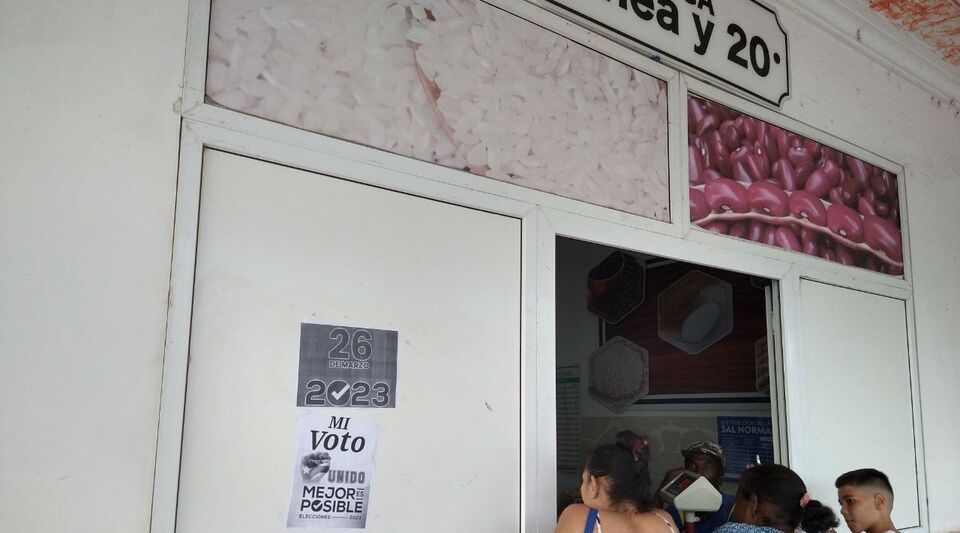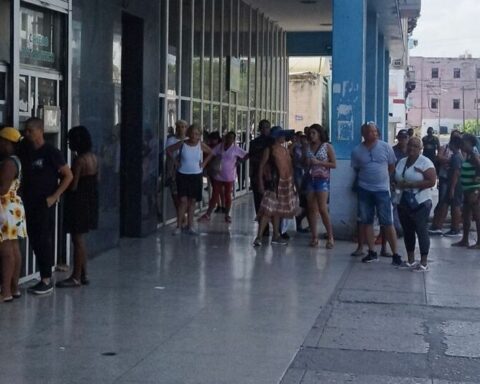To vote or not to vote in the elections for Parliament, next March 26,
It is a dilemma that many Cubans have already taken sides with. The economic crisis, the lack of hope and little confidence in State institutions favor abstention in a country where not going to the polls is considered a political statement and can lead to reprisals.
Among those who are overcoming fear and assure that they will not vote, there are retirees whose pension is not enough, young people who have seen nothing but scarcity since they were born, and potential migrants who have their eyes set outside the Island. The discontent and mistrust that beat in Cuban society could materialize in an increase in abstention next Sunday.
On Infanta street, a young man was looking this Wednesday, inside a rationed market warehouse, at one of the many official posters that in recent weeks have promoted a united vote for parliamentary candidates. The colorful advertising stands out in the store, with only a couple of products on display. A few centimeters away, a small blackboard announces that the cigars and cigars corresponding to the month of January are being sold in the premises.
“It’s not going to change anything if I go or not,” he told ’14ymedio’. “My mother has been attending all these processes for 40 years and what does she have now?: Nothing”
“I don’t even plan to go out that day, I’m going to even close the windows so they’re not bothering me to go vote,” clarified another young woman who came to the warehouse to ask about the arrival of the salt. “Two years ago I turned 16 and I’m on the electoral roll but I’m not interested. I didn’t go to vote for the Family Code [en septiembre de 2022] and I’m not going to go this time either”, he assures emphatically.
The reason that the young woman exposes borders more on indifference than rebellion. “It’s not going to change anything if I go or don’t go,” she comments to 14ymedio. “My mother has been attending all these processes for 40 years and what does she have now? Nothing, a half-collapsed house, four old rags to wear and some children who only think about leaving this country as soon as they can.”
While he is talking, an old woman arrives at the winery who does not join the conversation and makes a denial gesture when she hears the young woman’s words. It is in the elderly where the official propaganda of the united vote and attendance at the polls as a show of support for the system penetrates more deeply. They are the ones who fear a change the most or have spent the most years of their lives supporting the government.
In front of the door of his house stretches a street that years ago lost part of the asphalt, garbage accumulates on the nearby corner, while the queue for the only kiosk that sells food in the area almost reaches his window. Maurín, 21, lives in the Havana neighborhood of San Pedro in the municipality of El Cotorro. “How am I going to vote if they haven’t even fixed the basics for us?” the young woman is indignant.
With an engineer father and a nurse mother, Maurín questions the role of the People’s Power delegates in his neighborhood and the possibility of parliamentarians to improve the lives of citizens. “In San Pedro we have spent years and years demanding in the Accountability meetings [ante los delegados] that they fix our streets, that the quality of bread improves and that they open new stores to buy food, but none of that has been resolved”.
Disbelief has taken over many of the residents in the area, a phenomenon that is repeated throughout the country. To try to arouse enthusiasm, the Cuban ruling party has launched a campaign in recent weeks that includes meetings with voters, an avalanche of publicity in the national media, the reduction in annoying blackouts, and agricultural fairs to sell food at prices a little cheaper than in private markets.
However, the ideological offensive does not seem to be bearing much fruit among a population that is tired of so many daily difficulties. For Maritza, 64, until recently an employee of a department of the Ministry of Culture, it is striking how people in the streets no longer hide the fact that she will not attend the polling station on Sunday.
The government of Miguel Díaz-Canel seems to fear a growth in abstention, which for decades remained below 10%, but has experienced a significant rise in recent years. In the municipal elections last November it reached a historical maximum with 30% of voters absent. For the ruling party, attendance is measured as a sign of support for the system and the Communist Party.
“In the queue at the bank I heard two employees who were talking and said that they are not going to vote on Sunday. It is unprecedented for me that in a state-owned work center people speak with such nonchalance in frank defiance of the system,” he told this diary. “Before that was unthinkable and it is a sign that between fear and defiance, many are choosing defiance.”
The Cuban dissidents have also raised the tone in their calls for abstention as the electoral date approaches and, for the first time in a long time, they have agreed on the premise of “I do not vote” to which they have joined activists of various political colors.
“All the leaders follow the same ideology and nothing changes once they are elected”
In Santa Clara, Ignacio, 47, a self-employed worker, has also decided to abstain. “The deputies will not solve any problem because they are cogs in this machinery but not its essence, for the most part they are a group of puppets without a voice or a vote because everything in Cuba has always been planned in that ‘continuity’ manual,” he laments. .
Ignacio acknowledges that others will go to the polls but identifies their attendance not precisely with the belief that the National Assembly will help improve life on the Island. “One of the saddest things is the political apathy of this town and the hopelessness that leads to voting or making any decision dictated by the Government, such as voting for all,” he stresses.
Others, like Jorge, a 23-year-old university student who lives in Camajuaní, Villa Clara, acknowledges that he will go to vote on March 26 because he feels that attendance is “practically mandatory.” He does not want to point himself out publicly and prefers to avoid the reprisals from teachers that not going could lead to.
However, he acknowledges that no parliamentary candidate represents him “because the policy they defend has nothing to do” with the young man’s way of thinking. “The electoral process will solve absolutely nothing. All the leaders follow the same ideology and nothing changes once they are elected,” he concludes skeptically.
There are also those who seem impervious to the official campaign for the 26M elections and say they are not even aware that a vote will take place this March. “I’m not up for that, my thing is to survive every day and wait for my sister to find me a sponsor to go to the United States,” acknowledges Jean Marcos, 19. “The only place I am going to go, yes or yes, is to the airport when I have my flight.”
Jean Marcos’s friends share his position. Given the choice between the ticket or the ticket, they all seem to opt for something that gets them out of Cuba as soon as possible.
________________________
Collaborate with our work:
The team of 14ymedio He is committed to doing serious journalism that reflects the reality of deep Cuba. Thank you for accompanying us on this long road. We invite you to continue supporting us, but this time becoming a member of our newspaper. Together we can continue transforming journalism in Cuba.








